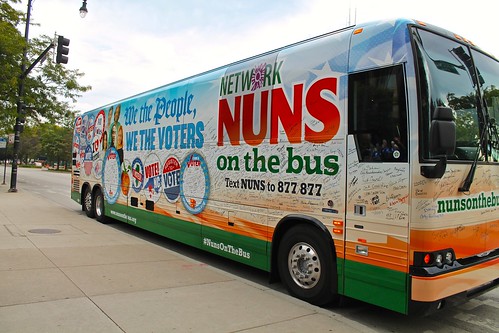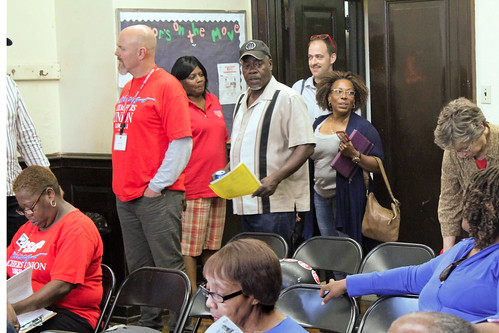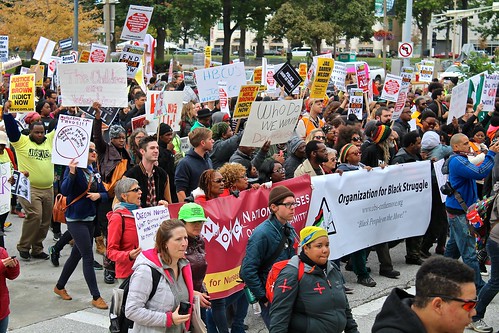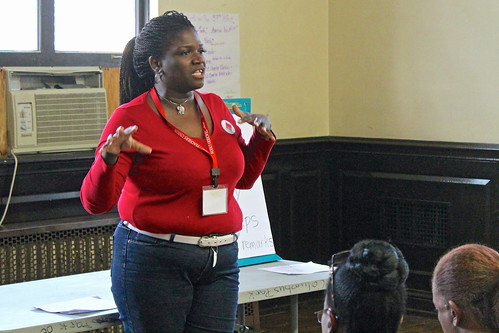
My review of The Package King: A Rank and File History of the United Parcel Service by Joe Allen–
Filed under: Global issues, Society and Economy, Unions, US politics

“Working at UPS should be the best job in America and it just isn’t.” — — a Teamster negotiator to a UPS official during the tense 1997 national contract negotiations.
I was once a package driver for a brief time back in the 1970’s at a non-union local Silver Spring MD delivery company. I did enjoy being out on the road, meeting people on the loading docks, listening to the occasionally humorous chatter on the dispatch radio and knowing the best places around DC to cop a submarine sandwich for lunch.
But one day after almost 12 hours on the road, I fell asleep in the slow lane of a Northern Virginia highway and woke up in the fast lane. I was lucky. I could have killed several people including myself. I quit that company soon afterward and found warehouse and trucking work at a place with regular hours and a union.
Yes, working for United Parcel Service, the leading US package delivery company should be a good job, as the anonymous Teamster negotiator indicated. Joe Allen’s new book, The Package King: A Rank and File History of the United Parcel Service , explains why it isn’t.
Today’s UPS package drivers are subjected to intense surveillance, constant speedup, are subject to serious injury and face a harsh disciplinary system where guilt is assumed. In the warehouses, workers are subjected to brutal unsafe working conditions and many are part-timers laboring at poverty wages.
Confederate flags are coming down but denial of racism remains
Filed under: Race and gender, Society and Economy, US politics

Chicagoans gathered to honor the dead from the Charleston terrorist attack
After the terrorist attack in Charleston there were ceremonies across the nation to remember the dead and protest the atrocity. But prominent Republicans and their allies stumbled all over each other denying that race had anything to do with it. Since then some have retreated a bit and asked that Confederate flags be removed from public buildings, but denial of racism is still running strong both in rightwing political circles and in the mass media.
Denial of racism is a characteristic of 21st century US white supremacy. In its roughly 350 year history on this continent, racism has demonstrated a Darwinian adaptability to changing socio-economic conditions.
The US racial caste system evolved from the invention of lifetime African American slavery, while white labor was allowed limited freedom. This was a key feature of colonial capitalism and was codified into law by the early 18th century. It was understood by the ruling classes of the time that racial division was necessary for the survival of capitalism as they knew it.
But as capitalism evolved after the abolition of slavery, the racial caste system changed to a combination of legal and informal segregation with the racial division of labor still basically intact.
Today, thanks to the civil rights movement, the US racial caste system is technically illegal. But enforcement of anti-discrimination laws has been weak and inconsistent. That and concealing racism’s outward manifestations in a cloud of obfuscation and denial helps maintain the essentials of its existence.
I doubt most lower and middle class racism denialists really believe what they are saying, but think the racial caste system must continue to ensure their own socio-economic standing, which has become increasingly precarious. A white skin now offers less and less protection from the ravages of 21st century austerity capitalism, so they cling to the lies of racism like a drowning person reaching for a scrap of wood after a shipwreck.
Some white people have chosen another path, multi-racial solidarity to change a socio-economic system that still requires a racial caste system based on melanin content. This is a leap of imagination too great for many white people at this time, fraught as it is with the possibilities of social ostracism, danger and unknown consequences.
Yet we know that human beings are a very adaptable species and today’s racism denialist can be tomorrow’s anti-racist activist, once the cloud of lies and delusions is pierced. I’ve seen it happen, though not often enough. Whence, the mass propaganda campaign of denying that racism is a problem or that it even exists anymore.
Personally, I doubt capitalism could even survive racial equality in this country. But if it did it would be a form of capitalism unrecognizable to anyone living today.
After centuries of struggle, racial equality remains a distant goal, yet less distant than before because of the sacrifices made by our predecessors and by those working for it today. Fannie Lou Hamer once said that she was “sick and tired of being sick and tired.”
But she and others like her pushed on anyway, so that yesterday’s Jim Crow-style-in-your-face racism, though hardly extinct as the recent Charleston Massacre demonstrates, has been forced into a retreat as denial of racism grows in importance.
The future is unwritten and making racial equality a part of that future continues to be one of the greatest challenges this nation faces.
Denial of racial reality only delays us from reaching that goal.
The Chicago election: the electoral revolution that didn’t happen
Filed under: Race and gender, Society and Economy, Unions, US politics
It was one helluva an election season on the shores of Lake Michigan. Last summer I was brimming with optimism. The Chicago Teachers Union(CTU) had people out canvassing the neighborhoods. CTU President Karen Lewis was polling well in a possible mayoral bid and it looked like Mayor Rahm Emanuel was on the run.
I foresaw an electoral revolution in the works. As a veteran of the Harold Washington days, I imagined the charismatic Karen Lewis recruiting a working class army of supporters, including the the working poor and the unemployed. Energetic reform candidates for City Council would emerge. Many of the largely Black and Brown non-voters would finally have something worth voting for—for a change.
A multi-racial rainbow coalition would sweep into power on election day and the day after election day, face the combined wrath of the LaSalle Street bankers and hedge fund bunco artists. But we would not only have people in office, we’d have a powerful movement for social and economic justice to back them up.
It didn’t happen. Karen announced that she was seriously ill with a brain tumor and could not run. She is now undergoing treatment. (BTW Chicagoans love to call their politicians by their first names).
Chicago: It’s about more than just an election
Filed under: Society and Economy, US politics
For the past 6 months I worked on the electoral campaign of Zerlina Smith, a progressive candidate for Chicago City Council. She was part of a city-wide electoral revolt against austerity politics led by reform Democrats and political independents. She did not win outright or make the run-off, but some of the candidates did, including Chuy Garcia who is challenging Mayor Rahm Emanuel in the runoff election. I’ve had a little time to think about what I experienced.
I left a socialist meeting last night where we spent a couple of hours talking about the recent Chicago election. I think the word “money” came up more than the word “votes”.It was an acknowledgment that in our so-called democracy, “Money doesn’t talk, it swears.”
It reminded me of the training session I attended for candidates and election volunteers sponsored by a progressive political alliance. We were told in complete seriousness that one of the the most important jobs of the candidate was to get on the phone and call everyone that he or she knew—-and ask them for money.
And it was the campaign manager’s job to make sure that the candidate put in their required number of hours on the phone—whether they liked it or not.

Ferguson means fight back: Thousands march in St. Louis against police violence
Filed under: Race and gender, Society and Economy, US politics
When Mike Brown was shot to death in Ferguson MO last summer, his hands up in surrender, he didn’t know when he awoke that morning that he would die that day as yet another victim of American racism. Neither did Oscar Grant, Trayvon Martin, Rekia Boyd or countless others, going back to when the first Black slave was killed for resisting their involuntary servitude.
That we are forced to carry signs that read “Black Lives Matter” in 2014 is a measure of how far the USA may have advanced in years but not in wisdom.
So we gathered once again in mourning and in anger. This time it was in downtown St Louis on October 11, part of a month-long series of events called Ferguson October. I boarded a bus at 4:30 am from South Side Chicago sponsored by the Chicago Teachers Union (CTU) and Action Now (a local community organizing group).
By around noon we were on Market Street in St Louis, marching past gray fortress-like court and government buildings that promise to guard justice and democracy, but too often fail to protect either.
When the Nuns on the Bus rolled into Chicago
Filed under: Society and Economy, Unions, US politics
“We are working on voter registration which is an action people can take easily. It’s so important because there is so much big money in our country trying to steer legislation away from the common good.”– Dr. Patricia M. Fishman, Sisters of Mercy Associate
Nuns on the Bus? It sounds like a joke. But while the Catholic sisters of Nuns on the Bus do joke and laugh often, their mission is a serious one of social justice and compassion for the oppressed.
It was no joke to Sister Marie McKenna who is a social activist in Chicago:
“I work with a lot of people who can’t afford to pay their rent. They’re working full time but there is no living wage for them. Lots of folks are pulled into part-time employment situations with no benefits. If there is an illness or anything that disrupts even a short period of time, people are going under.”
Started in 2012 as a reaction to the Paul Ryan budget which punished people simply for the “sin” of being poor, Nuns on the Bus is a traveling group of nuns who ride across the country to promote their social justice agenda. In 2013, the theme of Nuns of the Bus was immigration. In 2014 it was voter registration.
Chicago was one of the bus stops for a day of action last week on Thursday September 25, 2014.

Working with Arise Chicago, a local workers center, there were plans for a morning of voter registration among students at the University of Illinois at Chicago (UIC), a meeting with Governor Pat Quinn where 3 low wage workers could tell their stories and a picnic in Union Park followed by a press conference and rally. Read more
The USA’s toxic culture of white wealth
Filed under: Race and gender, Society and Economy, US politics
“Despite all evidence to the contrary, blaming black culture for racial inequality remains politically dominant. And not only on the Right.”—–Jonah Birch & Paul Heideman
This morning I read the latest attempt to chip away at the “culture of poverty” mythology that has survived all previous attempts to debunk it. Published in the always interesting Jacobin Magazine, the article “The Poverty of Culture” by Jonah Birch & Paul Heideman got me rethinking my own ideas on the subject.
So here goes a BobboSphere reaction to the Jacobin article:
If you believe the dominant narrative in today’s mass media and political culture, racial inequality and its accompanying economic inequality is the fault of African Americans because of their supposed “culture of poverty”. This monstrous canard has been disproved in countless studies, but somehow its proponents never get voted off the island.
What the corporate owned media does not dwell upon is the toxic “culture of wealth” that exists within the white corporate elite (yes, it is still white dominated). They prefer to overlook the white corporate elite’s propensity toward coldblooded mass violence in the form of the wars they help start, of their criminality as evidenced by their massive financial and environmental crimes, or their contempt for work as shown by the habit of driving down wages, and assigning jobs based on race and gender while treating employees with inhumane disrespect. Read more
Fred Wright: Labor Laffs for the Working Class
Filed under: Media, Unions, US politics
“There is a thin line that separates laughter and pain, comedy and tragedy, humor and hurt.” ― Erma Bombeck
Labor cartoonist Fred Wright was a radical artist who walked that thin line in a way that would impress any circus tightrope walker. The son of working class parents, Fred Wright knew the world of class warfare up-close and personal when he first began cartooning for the National Maritime Union (NMU) in 1939. He became staff cartoonist for the United Electrical, Radio and Machine Workers of America (UE) in 1949, a job he held until the early 1980’s.
Layoffs, industrial accidents, harassment of all types, discrimination, poverty wages, union-busting, exposure to mean bosses and other human tragedies were the basis for his humor.
Poet and playwright Bertolt Brecht once said,”The man who laughs has not yet heard the terrible news.” Fred Wright was used to hearing terrible news. It was all around him. And like Brecht, Wright understood how tragedy can be the basis of humor; humor that can help people laugh in the face of adversity and then if possible, organize and try to prevent the same tragedies from happening again.
Chicagoans prepare to take back their city: A view from the West Side
Filed under: Education, Unions, US politics
“Imagine what a community would look like that you and your children deserve and what are you willing to do to bring that to fruition.”—–Tara Stamps
Chicago Teachers Union(CTU) activist and West Side resident Tara Stamps repeated variations of that phrase in a packed community July 17th meeting held at LaFollette Park in the 37th Ward within the Austin neighborhood on Chicago’s far West Side. Each time she said it, she spoke slowly and distinctly to catch people’s attention.

West Siders and allies gather in the LaFollette Park fieldhouse on Chicago’s West Side
With the expected announcement that CTU President Karen Lewis will run for Mayor against Rahm Emanuel, along with plans by the CTU and groups like the newly formed United Working Families to conduct massive voter registration and coordinate efforts by progressive aldermanic campaigns, meetings like this one at LaFollette Park take on a more urgent significance. It is a good example of the working class community organizing that is going on Chicago right now.There have been a number of similar meetings across the city in recent weeks.
Austin is Chicago’s largest neighborhood by physical area. Like much of the largely African American West Side, Austin has been hit hard by divestment, unemployment, low wage employment, foreclosures, street violence, and school closings, as well as school privatization through ”turnarounds” and charters.
The year 2014 marks the tenth anniversary of the decision by the Board of Education under Arne Duncan to close Austin High School as a general high school for the community, instead putting three small schools (two of them charters) inside the cavernous building. Duncan’s attack on Austin (both the high school and the community at large) was one of the opening shots in the massive privatization and charter school plan that has unfolded in the decade since.
Brown v. Board Of Education at 60: Will we ever achieve compliance?
Filed under: Education, Race and gender, US politics
“The night the 1954 Brown decision to desegregate schools was announced, the NAACP Legal Defense Fund threw a party. Future Supreme Court Justice Thurgood Marshall, who had worked on the case was reported to have said this, ‘You fools go ahead and have your fun, but we ain’t begun to work yet.”
In 1952 my kindergarten class at Pleasant View Elementary School was located in a wooded area of suburban Wheaton MD, a working class community just outside of Washington DC. It was a child’s garden of earthly delights.
Each day brought new wonders: new songs, new stories, new indoor projects, big kids showing off green snakes from the forest and visits to the school hatchery where I watched baby chicks emerge from eggs. I loved climbing to the summit of the jungle gym where I thought it might be warmer because it was closer to the sun. I was wrong, but the view was worth it.
Kindergarten at Pleasant View was the best educational experience of my 12 years in the Montgomery County school system. What I didn’t know at the age of 5 was that not far away, there were schools that didn’t look like Pleasant View at all.
A local civil rights leader named Romeo Horad spoke to the Montgomery County government about these segregated African American schools saying conditions were “deplorable”:
He told the Commissioners ‘not one Negro school in the county compares favorably with any white school’. He charged [that] the county government ‘disregarded’ conditions at Negro schools which he said include no running water, outdoor privy toilets, schools located far from Negro population centers, some near railroad tracks. All Negro schools, he said were overcrowded.”—- from a 1948 Washington Post article








